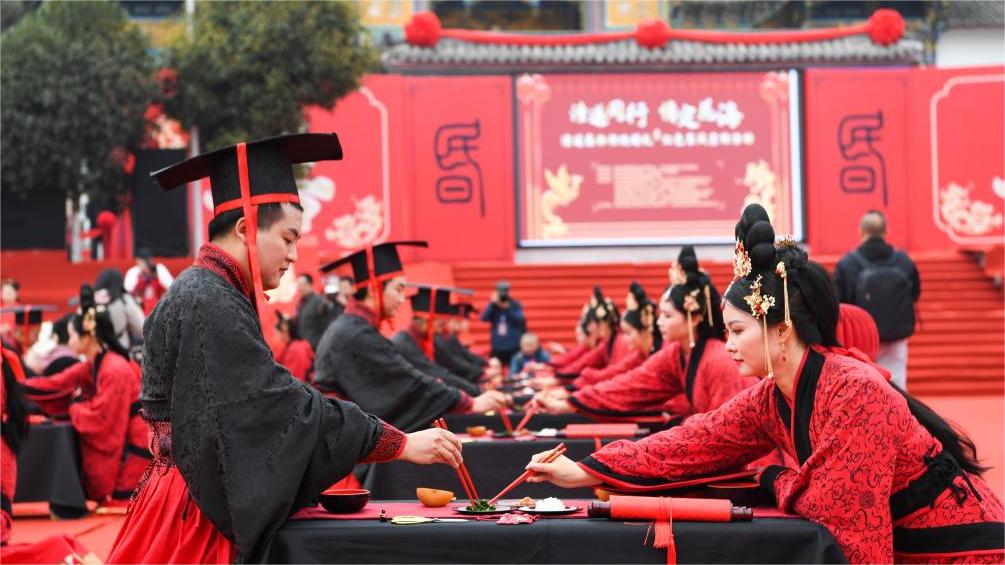Shaanxi's agri-tech sharing with BRI countries booms
In recent years, the Yangling Agricultural Hi-tech Industrial Demonstration Zone, the first national-level zone of its kind, in Yangling, northwest China's Shaanxi Province has actively integrated itself into the Belt and Road Initiative (BRI) and accelerated the building of a complete cross-border agricultural development system covering agricultural demonstration and promotion, production capacity cooperation, and technology exports.
This has turned the agricultural hi-tech zone into an important platform and window for China to open up its agriculture sector.

File photo shows members of Feng Baili's team checking on the growth of wheat at an agricultural demonstration park in Belarus. (Photo courtesy of the interviewee)
Yangling is also home to the only free trade zone and comprehensive bonded zone with a special focus on modern agriculture in the country, the Shanghai Cooperation Organization (SCO) demonstration base for agricultural technology exchange and training, and the Northwest A&F University (NWAFU).
"We have successively hosted over 50 international exchange activities, including the SCO forum on poverty reduction and sustainable development and the China-Central Asia agriculture ministers' meeting, helping enhance mutual trust and consensus for agricultural exchanges and cooperation between China and SCO countries as well as Belt and Road partner countries," said Ma Jing, an official at the agricultural hi-tech zone and the base.
The base has implemented targeted and practical training programs focused on the agricultural development status and talent training needs of different countries, promoting agricultural technology exchanges and economic and trade cooperation with the relevant nations.
In October 2023, Yangling launched a 14-day seminar on environmental protection for 13 Chilean officials, including the head of the Institute of Agricultural Research of the Chilean Ministry of Agriculture, who signed a cooperation agreement with a plant protection enterprise in Yangling.
"There are many cases like this, in which cooperation agreements were reached through exchanges and training," Tang Qinghua, a staff member at the base, said on March 1.
So far, the base has trained 35,000 agricultural officials and technicians from Belt and Road partner countries and SCO countries. It has also trained over 300 agriculture-related masters’ and doctoral students and 200 vocational students from these countries.
Over the past years, the Yangling Agricultural Hi-tech Industrial Demonstration Zone has built 10 modern agricultural demonstration parks in countries like Uzbekistan and Kazakhstan, helping to create cross-border agricultural industrial chains and industry clusters.
"Initially, our overseas agricultural parks were built for agricultural demonstration and promotion purposes. We brought domestic crop varieties and cultivation techniques there, allowing locals to see the results within a year or two. Once these results were achieved, we could ensure successful agricultural promotion," said Chen Bing, deputy general manager of Yangling Modern Agriculture International Cooperation Co., Ltd.
Yangling's overseas agricultural parks will next seek to be developed into production capacity cooperation parks.
"Currently, we have achieved initial results in this regard. After the team from Kazakhstan visited our cotton demonstration farms in Uzbekistan, they showed great interest and wanted to deepen cooperation with us, and plan to complete the construction of a 10,000-hectare cotton planting park this year," Chen said.
Yangling aims to promote not only crop varieties, but also agricultural technologies, standards, and machinery.
In order to build a new model for agriculture to "go global", Yangling has established the modern agricultural industry standardization research and promotion service center, which focuses on standardization efforts in fields like agriculture in arid lands in western China and Belt and Road partner countries.
Yangling has introduced quality crop varieties to Belt and Road countries and regions.
A team led by Feng Baili, a professor from NWAFU, introduced Chinese wheat varieties to an agricultural demonstration park in Belarus to study the varieties' resistance to disease, cold and lodging in winter under the conditions in the northeast of the country.
In Uzbekistan, the trial planting of figs from an agricultural park in Yangling was successful. The agricultural park plans to expand the planting scale of the fruit to introduce Yangling's new fig planting model abroad.
Photos
Related Stories
- Belt and Road cooperation to serve as engine for common development: Chinese FM
- US can't disrupt growing economic, trade ties between China and PICs
- China to test laser-based communication payloads for real-time maritime data transmission: CASIC president
- BRI cooperation provides progress and deepens friendships
- Chinese-built light rail project inaugurated in Nigeria's state of Lagos
- Interview: China achieves comprehensive development, fruitful Belt and Road cooperation, says Egyptian expert
Copyright © 2024 People's Daily Online. All Rights Reserved.









